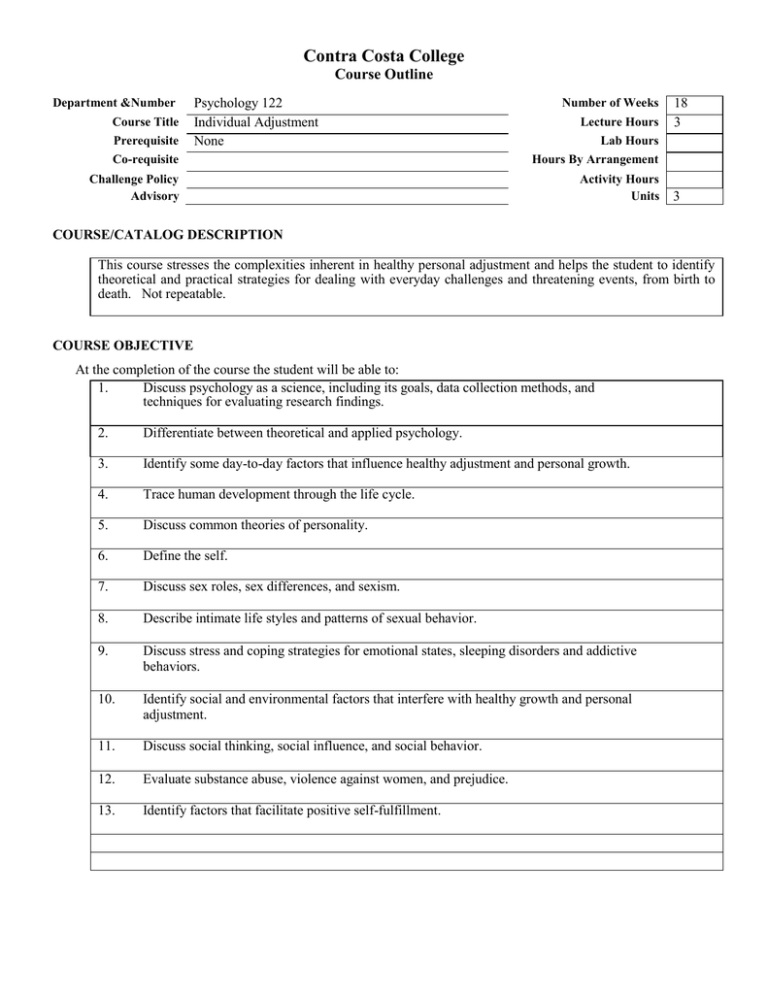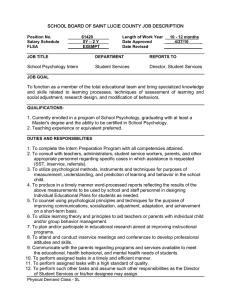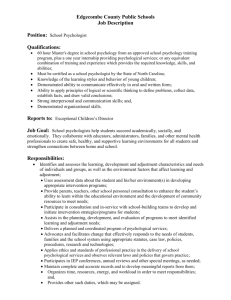
Contra Costa College
Course Outline
Department &Number
Course Title
Prerequisite
Psychology 122
Individual Adjustment
None
Number of Weeks
Lecture Hours
Lab Hours
Co-requisite
Hours By Arrangement
Challenge Policy
Advisory
Activity Hours
Units
18
3
3
COURSE/CATALOG DESCRIPTION
This course stresses the complexities inherent in healthy personal adjustment and helps the student to identify
theoretical and practical strategies for dealing with everyday challenges and threatening events, from birth to
death. Not repeatable.
COURSE OBJECTIVE
At the completion of the course the student will be able to:
1.
Discuss psychology as a science, including its goals, data collection methods, and
techniques for evaluating research findings.
2.
Differentiate between theoretical and applied psychology.
3.
Identify some day-to-day factors that influence healthy adjustment and personal growth.
4.
Trace human development through the life cycle.
5.
Discuss common theories of personality.
6.
Define the self.
7.
Discuss sex roles, sex differences, and sexism.
8.
Describe intimate life styles and patterns of sexual behavior.
9.
Discuss stress and coping strategies for emotional states, sleeping disorders and addictive
behaviors.
10.
Identify social and environmental factors that interfere with healthy growth and personal
adjustment.
11.
Discuss social thinking, social influence, and social behavior.
12.
Evaluate substance abuse, violence against women, and prejudice.
13.
Identify factors that facilitate positive self-fulfillment.
COURSE CONTENT: (In detail; attach additional information as needed and include percentage breakdown)
2
% Theoretical and applied psychology.
2
% Goals of science.
6
% Data collection methods.
5
% Evaluating research findings.
% Adjustment and personal growth.
10
% Human development through life cycle.
5
% Personality: three forces in psychology.
5
% The self.
5
10
% Sex roles, sex differences, and sexism.
5
% Attractions and love.
5
% Intimate lifestyles.
5
% Patterns of sexual behavior.
5
% Stress and adjustment.
5
% Coping with fear, depression, and anger.
5
% Coping with insomnia, weight-control, and smoking.
10
% Obedience to authority, social influence, group behavior, and social interaction with ethnic groups
and women.
5
% Seeking fulfillment in the workplace.
5
% Drugs, violence against women, and prejudice.
METHODS OF INSTRUCTION
Lecture and Discussion (e.g., large groups and small groups)
Audio-visual aids
Guest speakers
Required readings.
INSTRUCTIONAL MATERIALS
Textbook Title:
Psychology and Personal Growth
Author:
Arkoff and Goud
Publisher:
Allyn and Bacon
Edition/Date:
8th Edition 2008
COURSE EXPECTATIONS (Use applicable expectations)
Outside of Class Weekly Assignments
Hours per week
Weekly Reading Assignments
2
Weekly Writing Assignments
2
Weekly Math Problems
Lab or Software Application Assignments
Other Performance Assignments
2
STUDENT EVALUATION: (Show percentage breakdown for evaluation instruments)
33
% Midterm examination
33
% Final examination
34
% Weekly journals, reaction papers and/or term papers
GRADING POLICY (Choose LG, CR/NC, or SC)
Letter Grade
90% - 100% = A
80% - 89% = B
70% - 79% = C
60% - 69% = D
Below 60% = F
Prepared by:
Course New/Revision Date:
Course Effective Date:
Revised 11/07
Credit / No Credit
70% and above = Credit
Below 70% = No Credit
J. Vern Cromartie
February 2008
Spring/2008
X
Student Choice
90% - 100% = A
80% - 89% = B
70% - 79% = C
60% - 69% = D
Below 60% = F
or
70% and above = Credit
Below 70% = No Credit




